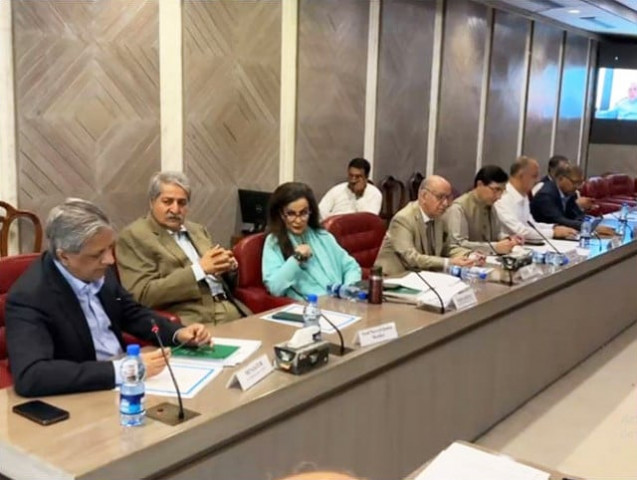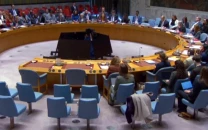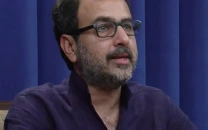Deadlock persists as constitutional amendment drafts reviewed in committee
JUI-F refuses to back government on constitutional amendments, opts to draft with PPP; PTI seeks founder’s input

Government’s efforts to gain opposition’s support for the 26th Constitutional Amendment remained stalled as another meeting of political parties in parliament ended without a consensus on Saturday.
The special parliamentary committee, chaired by Syed Khurshid Shah of PPP, reviewed various draft proposals from the government, Jamiat Ulema-e-Islam (JUI-F), and the Muttahida Qaumi Movement (MQM).
During the meeting, the government presented its proposed constitutional amendment draft, while JUI-F submitted a 24-point document. MQM also shared its recommendations. The proposed constitutional draft comprises 28 pages and suggests 56 amendments.
A sub-committee has been formed to review the constitutional drafts submitted by both the government and opposition parties. This sub-committee will evaluate the documents and provide its recommendations to the main parliamentary committee.
The sub-committee includes members from various political parties, such as Naveed Qamar from the Pakistan Peoples Party, Azam Nazeer Tarar from Pakistan Muslim League-Nawaz (PML-N), Barrister Gohar from Pakistan Tehreek-e-Insaf (PTI), Farooq Sattar from MQM, and Kamran Murtaza from JUI-F.
The ruling coalition has reached consensus on proposed constitutional amendments, but JUI-F has declined to support the government on the creation of a constitutional court, opting instead to form a joint draft with the PPP. Meanwhile, Pakistan Tehreek-e-Insaf (PTI) has decided to consult with its founder Imran Khan on the proposed amendments.
During the session, JUI-F presented its draft proposal, rejecting the government's plan for a constitutional court and instead suggesting the formation of a constitutional bench.
Senator Kamran Murtaza of JUI-F stated, “The only difference between the PPP and JUI-F drafts is the concept of a constitutional court versus a bench. We propose a bench instead of establishing a separate court.” He added that aside from this, there were no major objections to the PPP’s draft and expressed hope for a joint proposal soon.
In response to the government's 56-point proposal, Murtaza presented 24 counterpoints, arguing, “There is no need for a large setup for fewer than 200 constitutional cases.”
PPP leader Raja Pervez Ashraf echoed Murtaza's optimism, noting that JUI-F chief Maulana Fazlur Rehman suggested drafting a joint proposal with the PPP, which would be shared soon. “Things are moving in the right direction. Stay positive,” Ashraf remarked, adding that the October 25 deadline was unrelated to the constitutional amendment discussions.
Law Minister Azam Nazeer Tarar emphasised that such matters move forward through dialogue. “Is there anything that cannot be resolved within constitutional limits? Solutions won’t come through criticism alone; present your suggestions too. The country is at a standstill, and decisions are being criticised,” he said.
Meanwhile, PTI’s Chairman Barrister Gohar revealed that his party had not yet presented a draft. “We mentioned consulting with our founder yesterday, and that remains our plan,” Gohar said. PTI sources added that the party's leader, Omar Ayub, raised concerns during the meeting about the arrests of PTI workers. In response, Law Minister Tarar advised them to focus on the constitutional amendments for now, stating that other issues could be addressed later.
The parliamentary committee is scheduled to meet again on October 14 to continue discussions on the constitutional amendments.
Key provisions
The government's draft proposes the establishment of a federal constitutional court parallel to the Supreme Court. It also suggests three-year tenure for the chief justice of the proposed constitutional court and extends the retirement age to 68.
Under this amendment, votes cast by members of parliament against the directives of their parliamentary party would still be counted.
Proposed amendments also include changes to Article 78 of the Constitution, recommending the formation of the federal constitutional court. Additionally, amendments to Article 175 suggest that a commission will be responsible for appointing judges to the high courts and shariat court, with the chief justice of the constitutional court serving as the head of this commission.
The commission will consist of the two senior-most judges of the constitutional court, the chief justice of the Supreme Court, and two senior-most Supreme Court judges.
Furthermore, the amendment proposes the inclusion of the law minister, the attorney general, a senior advocate, and two members from both the National Assembly and Senate in the commission responsible for appointing judges to the constitutional court.
Unlike the current system, where Supreme Court judges are appointed by a commission headed by the chief Jjustice of the Supreme Court, the amendment proposes that three additional judges from the constitutional court be included instead of the Supreme Court.
Appointment process
The first chief justice and three senior judges of the federal constitutional court would be appointed on the recommendations of a parliamentary committee comprising four members of parliament, the federal law minister, and a representative of the Pakistan Bar Council.
The prime minister would forward the names proposed by the committee to the president, who would then make the appointments. The initial appointments of the chief justice and judges would be made by the president in consultation with the chief justice of the constitutional court.
The amendment also proposes that the chief justice of the Supreme Court be appointed based on recommendations from the National Assembly’s committee. The committee will nominate one of the three most senior Supreme Court judges for the position.
Structure of the federal constitutional court
The federal constitutional court will consist of seven judges, with one judge from each of the four provinces and one from the federal capital. Two expert judges would also be appointed. The amendment further proposes the use of the title "Chief Justice of the Supreme Court" instead of "Chief Justice of Pakistan." It also bars individuals with dual nationality from serving as judges in either the Supreme Court or the constitutional court.
For the appointment of high court judges, the commission will include the chief justice and the senior-most judge of the respective high court.
Executive powers
One of the key provisions states that no court, tribunal, or authority can inquire into any advice sent by the prime minister and cabinet to the president. The proposed amendments aim to reinforce the separation of powers between the judiciary and the executive.


















COMMENTS
Comments are moderated and generally will be posted if they are on-topic and not abusive.
For more information, please see our Comments FAQ